Lost In Myth: “Some Like It Hoth”—TV as Psychotherapist
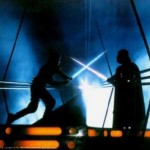 If you’ve read my writings about Lost, you probably know that I believe it’s more than just a show: Lost contains hidden messages about how the world really works. That’s right, I sincerely believe that a TV series is giving us clues that can help us understand the mysteries of life. Well, if that were true, shouldn’t Lost include this little tidbit within its own mythology? Shouldn’t it demonstrate how the media can provide answers to our own life challenges so that we’ll know to look there to find them? Yes, I believe it should, and to be honest, I’ve been wondering if it was ever going to do so. In “Some Like It Hoth,” I finally received my answer.
If you’ve read my writings about Lost, you probably know that I believe it’s more than just a show: Lost contains hidden messages about how the world really works. That’s right, I sincerely believe that a TV series is giving us clues that can help us understand the mysteries of life. Well, if that were true, shouldn’t Lost include this little tidbit within its own mythology? Shouldn’t it demonstrate how the media can provide answers to our own life challenges so that we’ll know to look there to find them? Yes, I believe it should, and to be honest, I’ve been wondering if it was ever going to do so. In “Some Like It Hoth,” I finally received my answer.
In many ways, I feel that “Some Like It Hoth” validated my interpretation of myths in the media. I believe that these myths subliminally provide us with information to help us solve our everyday issues and fulfill our lifelong destinies. Who says watching TV is a waste of time? Before I even get into that though, I first want to explore the more obvious theme of the episode. Like pretty much the entire Lost series, this episode dealt with daddy issues and how most of the characters are not dealing with theirs.
First we had Miles who had grown-up daddy-less and led to believe that his father abandoned him and his mother when he was just a baby. Hurley mentioned that his father had left when he was just ten, but they had recently reconciled and he was glad they did. This episode also featured Ben’s father who is so concerned about his missing son, he takes to drinking beers on a swing set and then goes back to mopping up floors. We all know how that relationship winds up. Then there’s Howard Gray, a man who hires Miles to find out if his dead son knew he loved him. At first, Miles takes his money and tells the father what he wanted to hear, that he did. Later however, he gives him his money back and tells the father that, “if you wanted your son to know you loved him, you should’ve told him when he was alive”—harsh words but an important reminder for the viewing audience.
From Sawyer, Locke, and Jack to Kate, Ben, and Walt, Lost has covered daddy issues many times before, to the point where it’s pretty much one of the major themes of the show. So why spend a whole episode on it? Reconcile with your father—we get it! Actually, I think this theme was used for a deeper reason, and, as is usually the case, this reason can be deciphered from the episode’s title.
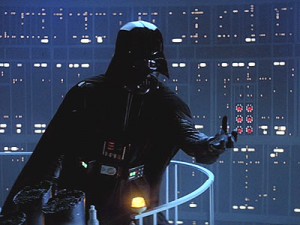 The “Hoth” of “Some like it Hoth” relates to the icy planet in The Empire Strikes Back. Icy—just like the father/son relationships depicted in this episode. While some like their relationships “hot” as we know the expression is meant to be, Miles prefers to have a cold relationship with his dad because of what he will allegedly do to his family. Of course, The Empire Strikes Back itself is probably the granddaddy of daddy-issue stories. Actually, Oedipus Rex is more of the granddaddy, Empire may be more of the big daddy. And let’s not forget Hamlet, Chinatown, and even The Wrestler—man, is there a daddy-issues prerequisite to being a writer? Maybe. Or maybe they’re just channeling the myth from the great-great granddaddy of daddy issues—the Bible. “Father, why have you forsaken me?” I don’t know kid, but perhaps 2,000 years of storytelling can help you figure it out. Seriously though, that’s a seed-level story that spawned millions more like it. And we know Lost deals with Biblical themes.
The “Hoth” of “Some like it Hoth” relates to the icy planet in The Empire Strikes Back. Icy—just like the father/son relationships depicted in this episode. While some like their relationships “hot” as we know the expression is meant to be, Miles prefers to have a cold relationship with his dad because of what he will allegedly do to his family. Of course, The Empire Strikes Back itself is probably the granddaddy of daddy-issue stories. Actually, Oedipus Rex is more of the granddaddy, Empire may be more of the big daddy. And let’s not forget Hamlet, Chinatown, and even The Wrestler—man, is there a daddy-issues prerequisite to being a writer? Maybe. Or maybe they’re just channeling the myth from the great-great granddaddy of daddy issues—the Bible. “Father, why have you forsaken me?” I don’t know kid, but perhaps 2,000 years of storytelling can help you figure it out. Seriously though, that’s a seed-level story that spawned millions more like it. And we know Lost deals with Biblical themes.
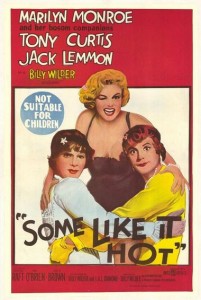 Hoth is only part of the hints we get from the episode title. The other is the movie title that is being spoofed—Some Like It Hot. In the 1959 film, Jack Lemmon and Tony Curtis are two funny guys who witness a murder, similar to Miles and Hurley discovering the corpse of DHARMA worker, Alvarez. In the movie, the two characters go undercover to avoid being discovered by the murderers, similar to how Miles and Hurley must continue their charade as DHARMA employees. Just like in the movie though, it looks like the jig is up when at the end, Sawyer’s plot is discovered by the nosey, Phil. After the weasel-like Phil admits to not telling anyone else, Sawyer punches him in the face and lots of laughter ensues.
Hoth is only part of the hints we get from the episode title. The other is the movie title that is being spoofed—Some Like It Hot. In the 1959 film, Jack Lemmon and Tony Curtis are two funny guys who witness a murder, similar to Miles and Hurley discovering the corpse of DHARMA worker, Alvarez. In the movie, the two characters go undercover to avoid being discovered by the murderers, similar to how Miles and Hurley must continue their charade as DHARMA employees. Just like in the movie though, it looks like the jig is up when at the end, Sawyer’s plot is discovered by the nosey, Phil. After the weasel-like Phil admits to not telling anyone else, Sawyer punches him in the face and lots of laughter ensues.
The Lost connections don’t end there either. Do they ever? Just as everything is connected on Lost, so it is in the real world. I can’t wait to find out how many of these connections were actually planned by the writers and how many were planned by the universe. For this next one, I would bet it’s the latter. In addition to being a very funny Marilyn Monroe movie, “Some Like It Hot” is also a hit song by the 1980s supergroup…wait for it…The Power Station. 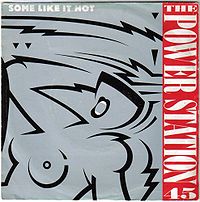 As in, the powerful Swan station that is being built in this episode. Even weirder, the group took its name from the Power Station studio in New York City where it recorded it’s first album. The name of this recording studio today? Avatar Studios. Avatar, as in a god that incarnates into another form on earth. A Richard Alpert type if you will. Then again, isn’t there another definition of an avatar? Isn’t it also a graphical image of a real person that exists on the Internet? An image that you might use with any identity you choose, say a Marvin Candle, Mark Wickmund, or Edgar Halliwax? What conclusions can we draw from with this little free association with the universe, hmmm? On second thought, I’ll let you draw your own conclusions lest the Lost powers that be decide to pay me a little visit.
As in, the powerful Swan station that is being built in this episode. Even weirder, the group took its name from the Power Station studio in New York City where it recorded it’s first album. The name of this recording studio today? Avatar Studios. Avatar, as in a god that incarnates into another form on earth. A Richard Alpert type if you will. Then again, isn’t there another definition of an avatar? Isn’t it also a graphical image of a real person that exists on the Internet? An image that you might use with any identity you choose, say a Marvin Candle, Mark Wickmund, or Edgar Halliwax? What conclusions can we draw from with this little free association with the universe, hmmm? On second thought, I’ll let you draw your own conclusions lest the Lost powers that be decide to pay me a little visit.
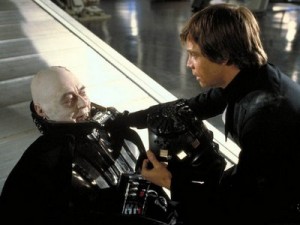 Getting back to the daddy issues and the title of the show, so…what’s my point? My point relates to Hurley using The Empire Strikes Back to illustrate to Miles the repercussions of not talking things out with your dad—you get your arm chopped off, metaphorically speaking. (Then again, as Tom Mohan, leader of the NYC Lost Meetup Group pointed out, considering that Hurley watched Empire over 200 times, shouldn’t he have remembered that Luke found out Darth was his dad after he got his arm chopped off? Okay, we’ll let that one slide.) Just as Hurley used Empire to help convince Miles to make up with his dad, we can use Lost (and other myths in the media) to help us with our own life challenges. Subliminally, Lost is helping us deal with our own life issues. No wonder we’re so addicted.
Getting back to the daddy issues and the title of the show, so…what’s my point? My point relates to Hurley using The Empire Strikes Back to illustrate to Miles the repercussions of not talking things out with your dad—you get your arm chopped off, metaphorically speaking. (Then again, as Tom Mohan, leader of the NYC Lost Meetup Group pointed out, considering that Hurley watched Empire over 200 times, shouldn’t he have remembered that Luke found out Darth was his dad after he got his arm chopped off? Okay, we’ll let that one slide.) Just as Hurley used Empire to help convince Miles to make up with his dad, we can use Lost (and other myths in the media) to help us with our own life challenges. Subliminally, Lost is helping us deal with our own life issues. No wonder we’re so addicted.
Hurley represents the fans. He is us. By explaining life via the mythology of Star Wars, the real message is that we can use Lost’s wisdom in our own lives. And the more you study media myths, the better you’ll get at deciphering them. While right now, in the words of Hurley, “my power is better than your power,” if you continue practicing, perhaps one day you’ll be able to repeat the words of Darth Vader to me: “The circle is now complete. When I left you I was but the learner, now I AM THE MASTER!” Just be prepared to prove it.
In Two Weeks: Will “The Variable” prove to be an event that can change everything? The one thing that can have a domino effect on the outcomes of every event that followed? Is it this variable that Ben and Widmore are fighting for? Or am I just taking stabs in the dark like the polar bear prediction from last week? Find out next time on “Lost In Myth”!
Marc Oromaner is a New York City writer whose new book, The Myth of Lost offers a simple solution to Lost and how it provides hidden insight into the mysteries of life. He can be contacted in the discussion section of The Myth of Lost Facebook page.
The Myth of Lost is available on Amazon and barnesandnoble.com.


